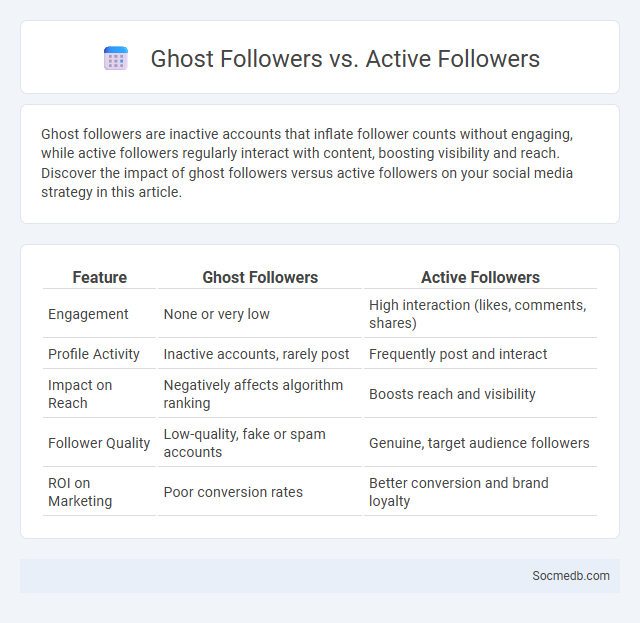
Photo illustration: Ghost Followers vs Active Followers
Ghost followers are inactive accounts that inflate follower counts without engaging, while active followers regularly interact with content, boosting visibility and reach. Discover the impact of ghost followers versus active followers on your social media strategy in this article.
Table of Comparison
| Feature | Ghost Followers | Active Followers |
|---|---|---|
| Engagement | None or very low | High interaction (likes, comments, shares) |
| Profile Activity | Inactive accounts, rarely post | Frequently post and interact |
| Impact on Reach | Negatively affects algorithm ranking | Boosts reach and visibility |
| Follower Quality | Low-quality, fake or spam accounts | Genuine, target audience followers |
| ROI on Marketing | Poor conversion rates | Better conversion and brand loyalty |
Understanding Ghost Followers: Definition and Impact
Ghost followers are inactive or fake accounts that follow social media profiles without engaging with content, skewing follower metrics and reducing overall engagement rates. These accounts often inflate follower counts artificially, misleading brands and influencers about their true audience reach and interaction levels. Identifying and managing ghost followers is crucial for accurate analytics, improved engagement, and fostering genuine community growth on platforms like Instagram, Twitter, and Facebook.
Who Are Active Followers? Characteristics and Benefits
Active followers are social media users who consistently engage with your content through likes, comments, shares, and direct messages, reflecting genuine interest and brand loyalty. These followers often exhibit characteristics such as responsiveness, frequent interaction, and advocacy, which can increase your reach organically and enhance community trust. Leveraging active followers helps boost your social media algorithm ranking and drives meaningful conversations around your brand, ultimately amplifying your online presence.
The Role of Following: Why It Matters
Following specific accounts on social media shapes your content feed, influencing the information and trends you encounter daily. This curated flow impacts your interests, opinions, and even purchasing decisions by connecting you with relevant influencers, brands, and communities. Understanding the role of following allows you to tailor your online experience, enhancing engagement and fostering meaningful digital relationships.
Ghost Followers vs Active Followers: Key Differences
Ghost followers are inactive accounts that do not engage with your social media content, lowering your engagement rate and potentially harming your online credibility. Active followers regularly like, comment, and share your posts, contributing to increased visibility and authentic growth of your social media presence. Understanding the key differences between ghost followers and active followers helps you optimize your strategy for meaningful audience interaction and improved algorithm performance.
How Ghost Followers Affect Engagement Rates
Ghost followers significantly reduce social media engagement rates by inflating follower counts without interacting with content, leading to misleading metrics and lower visibility in platform algorithms. These inactive accounts skew engagement ratios such as likes, comments, and shares, undermining the credibility of influencer partnerships and marketing campaigns. Brands relying on authentic engagement metrics risk ineffective targeting and lost revenue when ghost followers dominate their audience profile.
Identifying Ghost Followers Within Your Audience
Identifying ghost followers within your social media audience is crucial for maintaining genuine engagement and accurate analytics. These inactive accounts do not interact with your content, skewing metrics and reducing the effectiveness of your communication strategies. You can use specialized tools and manual methods to detect and remove ghost followers, ensuring a more authentic and responsive community.
Strategies to Convert Ghost Followers into Active Supporters
Leveraging personalized engagement strategies, such as targeted content and interactive polls, enhances the likelihood of converting ghost followers into active supporters on social media platforms. Implementing data-driven analytics to identify inactive follower patterns allows brands to tailor outreach efforts effectively, maximizing user interaction rates. Consistent value delivery through exclusive offers and behind-the-scenes content fosters trust and encourages dormant audiences to participate in community conversations.
Benefits of Cultivating Active Followers
Cultivating active followers on social media enhances brand visibility and drives meaningful engagement, fostering a loyal community that amplifies your message through shares and comments. These followers provide valuable feedback, helping you tailor content and improve your offerings to meet audience needs. Engaging actively with your followers boosts your platform's algorithm ranking, increasing reach and opportunities for growth.
Balancing Following-to-Follower Ratio: Best Practices
Maintaining a balanced following-to-follower ratio on social media platforms enhances credibility and engagement by signaling authenticity to users and algorithms. Best practices include following relevant accounts within your niche, unfollowing inactive or irrelevant profiles regularly, and prioritizing quality interactions over mass followings. This strategic approach helps improve visibility, foster genuine connections, and optimize overall social media growth.
Tools and Techniques for Managing Followers and Following
Effective social media management tools like Hootsuite, Buffer, and Sprout Social enable users to track follower growth, schedule posts, and analyze engagement metrics to optimize interactions. Techniques such as audience segmentation, personalized content, and implementing follow/unfollow strategies help maintain active and relevant follower lists. Utilizing analytics dashboards and automation features streamlines identifying influential followers and managing large-scale following activities efficiently.
 socmedb.com
socmedb.com